Spatial Practices and Politics
serial of lectures, talks and events
The aim of the programme Spatial Practices and Politics is to present current researches and projects which cross the realm of art, architecture and urbanism and deal with diverse issues of contemporary urban environment. The program lays particular attention to critical analysis and creative suggestions which enable unusual and poetic uses and visions of contemporary cities; to the relation between city and nature, between art/culture and city planning/development; possibilities of reviving the public domain, re-claiming and re-thinking city spaces and empowering our decisions and actions within the city; critical rethinking of the notion of participation in art, architecture and urban planning; and to the possibilities of temporary uses of spaces.
2011
Mathias Heyden – Community based design in Berlin and beyond!
Auto-generative utopias and radical-emancipative civil politics for an architecture and planning yet to come
16th May 2011, Faculty of Architecture, Ljubljana
Introducing some typical Berlin top-down as well bottom-up urban cross-roads, the talk questioned the increasing informal, situative development of the city; and discussed what kind of production and use of the built environment may encourage (direct-)democratic and sustainable societies yet to come.
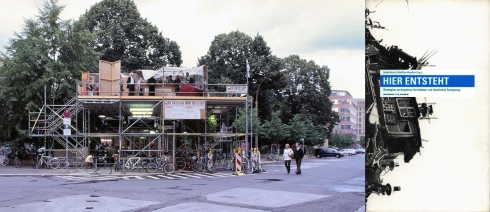
Under Construction, Berlin, 2003
Heyden presented the Berlin artist-squat K 77 (which co-founder and member he was between 1992-2002) and the research/event/publication UNDER CONSTRUCTION – Strategies of Participative Architecture and Spatial Appropriation. Further on Hayden talked about theories and practices, which seek to overcome the increasing individualization and privatization of societies and their spaces while reaching out to radically change urban policy on the political and administrative, economical, and finally on the civil level; so that the production and use of the built environment may become a matter of all – Community Based Design in Berlin, and beyond!
Mathias Heyden is a carpenter and architect. Today he operates under the name ISPARA, a Berlin based office and lab for strategies of participative architecture and spatial appropriation, and engages as researcher, artist, author, editor, and organizer. Recently he works as assistant professor at Technical University Berlin, Institute for Architecture, Chair for Urban Design and Architecture, as well as guest professor at Academy of Fine Arts in Nuremberg, chair for architecture and urban research.
Mathias Heyden: Workshop – Participatory Design through Ad Hoc Construction
16th-17th May 2011, location: Beyond a Construction Site – community urban garden, Resljeva Street, Ljubljana
Together with architecture students, Beyond a Construction Site participants, and others who had responded to the open invitation, we looked for architectural solutions to meet the needs and wishes for the community urban garden area, which Obrat members have been developing in a close collaboration with neighbourhood residents and other interested people. As a group, we developed a number of ideas and next day also partly realized them: we recycled chairs, tables, and benches that had been left for waste disposal and we built a construction for shelter from sun and rain and a pergola for shade near the entrance.
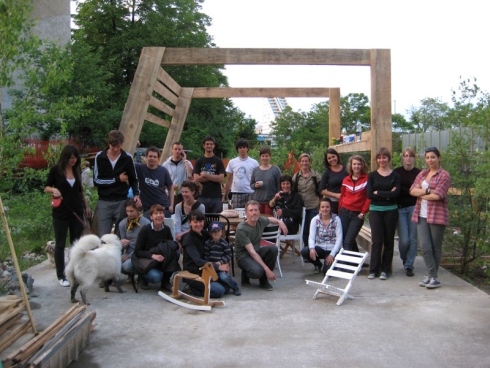
workshop participants
Lecture and workshop were organized in collaboration with the Ljubljana Faculty of Architecture.
………………………………………………………………………………………………………..
Tatjana Schneider – Spatial Agency / Mike Schalk / Marcus Bader – Raumlabor
11th January 2011, City Museum, Ljubljana
Tatjana Schneider, Spatial Agency
Spatial Agency is an ongoing research project by Tatjana Schneider, Jeremy Till and Nishat Awan that aims to shift the focus of architectural discourse from one that is centered around the design (= building) and making (= technology) of buildings to one where architecture is understood as a situated and embedded praxis conscious of and working with its social, economic and political context. It argues that architecture needs to change from a discipline that is focused around the production of architecture as a commodity, from a discipline that is driven by short term and exchange driven market-led demands of clients and developers to a discipline that takes on a more pro-active role. Architecture, in its broadest sense, needs to be extended to take into account the consequences of architecture as much as the objects of architecture.
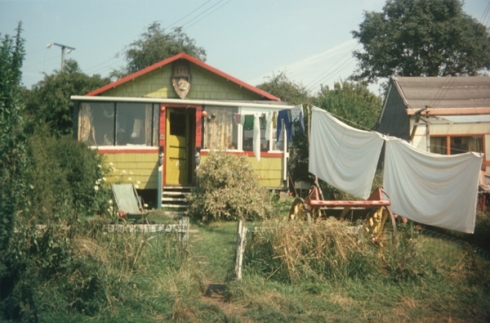
plotlands
The results of the Research, available on www.spatialagency.net, were in 2011 published by Routledge as Spatial Agency – Other Ways of Doing Architecture.
Tatjana Schneider is lecturer at the School of Architecture, University of Sheffield. She was a member of the worker’s cooperative G.L.A.S. (Glasgow Letters on Architecture and Space). Her work focuses on the production and political economy of the built environment.
………………………………………………………………………………………………………..
Mike Schalk
The presentation focused on theories and practices of participatory processes in design and planning by the example of the art project KAFIČ (2010), with Apolonija Šušteršič, for GfZK – Museum of Contemporary Art in Leipzig. It questions the benefit of open processes, as well as the fear of uncertainty for clients, participants, architects and artists when working collaboratively. The process of making in dialogue, participation, pedagogy and interaction.
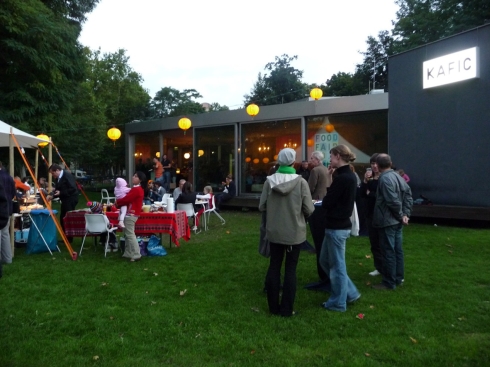
Meike Schalk is an architect and landscape architect. She teaches urban planning and design at the School of Architecture at The Royal Institute of Technology (KTH) in Stockholm. Schalk is editor of SITE magazine and a member of FATAL – Feminist Architecture Theory – Analysis Laboratory Education. Since 2005 she has collaborated with Apolonija Šusteršič on a number of public art projects involving participation.
………………………………………………………………………………………………………..
Marcus Bader – Raumlabor, Berlin
www.raumlabor.net
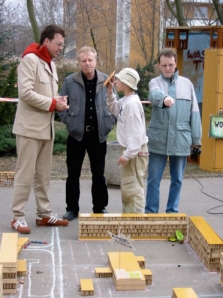
Ideenmarkt, Halle-Neustadt, 2005
Raumlabor began working on the issues of contemporary architecture and urbanism in 1999. In various interdisciplinary working teams they investigate strategies for urban renewal. Raumlabor does urban design, architectural design, build, interactive environments, research.
In the talk, Marcus Bader presented their urbanistic projects which include alternative urban development strategies and processes for public participation: Kolorado – Neustadt (2002-05), Ideenmarkt (2005), Hotel Neustadt (2003).
………………………………………………………………………………………………………..
Support: Ministry of Culture of Slovenia, City Museum, Ljubljana, and Faculty of Architecture – University of Ljubljana.
2009
Helen Stratford, Not Building – Cambourne 2009
2nd December 2009, Škuc Gallery, Ljubljana
Helen Stratford presented her research on Cambourne, a new ‘village’ close to Cambridge, UK. Since construction commenced in 1999, the land occupied by Cambourne has changed from agricultural farmland, to the layered infrastructure of a modern settlement with over 3300 homes. While presented as a traditional English linear ‘village’ organically grown over time, the development has been designed through a masterplanning process whereby elements of village life have been translated into diagrammatic form – 1 minute walking distances, play strategies and village greens. A hierarchy of open spaces, planned according to a checklist of projected use, demand a maintenance routine involving landscaping workers, groundsmen, wildlife managers, etc. to sustain the props that imply a certain kind of public use. However, whilst these spaces are defined and maintained, many of them are largely empty and unused.
In the design of its public spaces Cambourne refers to a centralised and fixed idea of ‘public.’ In her 6 months long research, Helen Stratford has been building relationships and connections with people who maintain the communal or public spaces to explore how the ‘village’ image of Cambourne is reproduced daily. She has been focusing on making these ‘support structures’ visible through mapping daily routes and routines. At the same time she has been intervening in these spaces to challenge centralised and fixed ideas surrounding public space and to propose other possibilities. Helen Stratford presented also artist book Mechanical Operations in Cambourne which she realized at the end of her research together with Lawrence Bradby.
Helen Stratford is an artist, architect and critical writer based in Cambridgeshire (UK). She completed postgraduate study in Architectural Practice and Critical Theory. She has been involved in organising and participating in works and projects that facilitate creative ways of thinking about, working in and creating public spaces. She is a member of ‘taking place’ a feminist collective of artists and architects, and is currently working with ‘urban laboratory’ on proposals for collaborative architecture/performance research. As an architect she works at MOLE, Cambridgeshire.
………………………………………………………………………………………………………..
Till Krause, Hamburg mapping project – Some examples of how maps can reflect and create reality through imagination
2nd December 2009, Škuc Gallery, Ljubljana
Since the beginning of the 1990s the work of the Hamburg based Galerie für Landschaftskunst (GFLK) has worked around the question of how we perceive space, city, landscape and nature. As an independent artist project space the GFLK mounts exhibitions, initiates and develops investigative projects, brings out publications and develops projects for landscape / urban spaces. A special interest of the GLFK are mapping projects and cartography. The city of Hamburg has served them as an exemplary field of observation and intervention in this connection for nearly two decades. Their mapping/cartography activities culminated in 2004 with the book and exhibition Mapping a City, which was installed at Hamburg Kunstverein.
In his presentation, Till Krause presented some of the GLFK Hamburg activities with special focus on their mapping/cartography projects in which they develop new perceptions of places and metamorphose them through imagination. Through GLFK exceptionally endeavor the Hamburg mapping/cartography projects in a variety of formats bring mulifaceted observations and artistic interpretations of landscape/urban spaces and different phenomena connected to them. In doing so, they provide sources for alternative visions of the city.
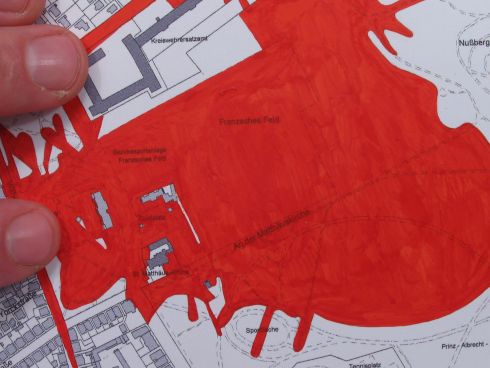
Till Krause, Blickfeldkarte
Till Krause studied art at Hamburg Art Academy. In 1993 he co-founded Museums Ferner Gegenden and in 1996 Galerie für Landschaftskunst, both in Hamburg. As an artist he relates to the environmental art legacy and develops artistic investigative project and maps (Hamburg-Kiel Axis, 2001-03; Cell phone map Africa, 2004; Death Zone Langenhagen, 2009, etc.).
………………………………………………………………………………………………………..
Britta Peters, Local Politics and Art in Public Space: For Example Hamburg
19th November 2009, Škuc Gallery, Ljubljana
The city of Hamburg used to enjoy a very good reputation for its art in public space program, which was officially installed in 1981. After 2000 a subtle changes in local cultural politics took place, which lead to a lot of critics from the side of local art protagonists and external viewers.
In her lecture, Britta Peters gave a brief history of the city of Hamburg ‘art in public space’ program and its prominent projects and presented its recent development in connection to city gentrification processes. In this regard she focused on a specific part of the city, Hamburg-Wilhelmsburg.
Britta Peters studied Cultural Science at the University of Lueneburg, DE. Works as art critic and curator in Hamburg. She curates art in public space projects (10°Kunst: Wilhelmsburger Freitag, 2007; Harburger Berge /with Tim Voss/, 2009); since 2008 co-curator of the art association Kunstverein Harburger Bahnhof e.V.
………………………………………………………………………………………………………..
Vesna Vuković, UrbanFestival. Politics of Space
(Some observations on the difficult relation of art, urbanism and politics)
19th November 2009, Škuc Gallery, Ljubljana
www.urbanfestival.hr
UrbanFestival is international festival of contemporary art in public spaces which acts in Zagreb since 2001. Through specific topics, artistic-research projects, as well as through specific forms of production UrbanFestival aims to broaden the territory of action outside the ‘protected’ walls of art institutions and to open public spaces as spaces of co-existence, confrontation of different views, as well as possible antagonisms. The festival further on supports the notion of the city as a space that is being produced by its citizens over and over again.
Starting from UrbanFestival examples, Vesna Vuković talked about how artistic actions propose alternative to the existing urban practices, institutions, and social relations.
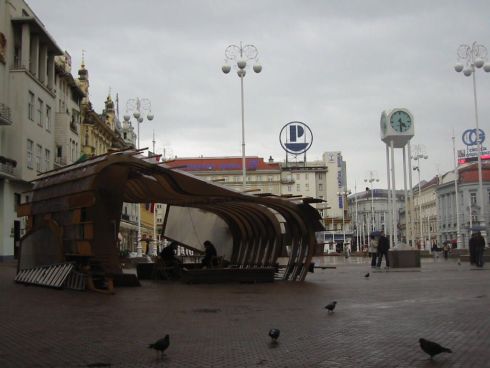
Slice 252: Slicing Zagreb, UrbanFestival 2003, photo: Vesna Vuković
Vesna Vuković is a cultural activist, translator, curator and researcher in the field of Public Art. Co-founder of the nongovernmental organization [BLOK] – Local Base for Culture Refreshment, Zagreb, curator of the international UrbanFestival, associate at Croatian Radio Third Program and Academy of Fine Arts Zagreb.
………………………………………………………………………………………………………..
Atelier d´Architecture Autogéré (aaa), At the ground level of the city
21st September 2009, at Špica, Ljubljana
www.urbantactics.org
The Atelier d´Architecture Autogéré studio of self-managed architecture (aaa) is a collective platform which conducts actions and research concerning urban mutations and cultural, social and political emerging practices in the contemporary city. Their main goal is to develop alternative approaches in architecture and urbanism. The interdisciplinary network was founded in 2001 by architects, artists, students, researchers, activists and residents from areas in the North of Paris.
ECObox, Paris (2001-)
A series of self-managed projects in the area of northern Paris encourages residents to get access to and critically transform temporary misused or underused spaces. These projects, initiated in 2001, value a flexible and reversible use of space, and aim to preserve urban ‘biodiversity’ by encouraging the co-existence of a wide range of life-styles and living practices. aaa began this process by establishing a temporary garden constructed out of recycled materials. The garden, called ECObox, has been progressively extended into a platform for urban criticism and creativity, which is curated by the aaa members, residents and external collaborators, and which catalyses activities at a local and trans-local level.
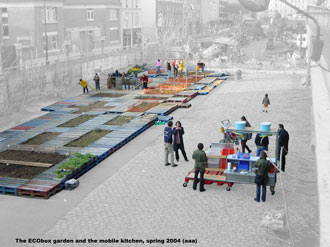
Passage 56 – a cultural and ecological space managed by residents of St. Blaise area, Paris (2006-)
This project explores the possibilities of an urban interstice to be transformed into a collectively self-managed space. Initiated in 2006 in the East of Paris, the project engaged a partnership between local government structures, local organizations, inhabitants of the area and a professional association which run training programmes in eco-construction.
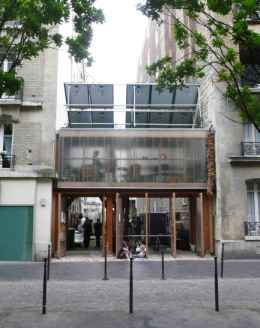
………………………………………………………………………………………………………..
Public debate: Participation?
22nd September 2009, at Špica, Ljubljana
Invited guests: Marko Peterlin (Institute for Policies of Space, Ljubljana), Doina Petrescu (aaa, Paris), Apolonija Šušteršič (artist, Amsterdam/Ljubljana), Maja Simoneti (urban planner and landscape architect, Ljubljana), Janez Koželj (architect and urban planner, vice-mayor of the City of Ljubljana)
Today participation is a standardised and institutionalised practice in art, architecture and urban planning. As such it is an organised and formalised (often also manipulated) procedure that presents the possibility of users/residents involvement in decision making. Too often the notion of participation is based on uncritical understanding which puts the ideal of a consensus and homogeneity in the centre. The debate departed from the position that participation can not and should not become a standardised norm or technique, because that presupposes also a standardised user/resident. As there is not an abstract community of users/residents, there is also not one common, general method of participation. Together with diverse users/residents, contexts and wishes, it is necessary to develop diverse forms and methods of participation.
In the talk invited guests presented their experiences and views on the notion of participation, methods and tools which they have developed in participative projects; talked about pleasures, problems and uncertainties which they encountered in such endeavours; exposed conditions which always determine participation; reflected on their role as mediators in the participative process and talked about the productive possibilities of conflicts which are permanently present in participative projects.
………………………………………………………………………………………………………..
The 2009 programme is supported by the Municipality of Ljubljana – Department for Culture and IFA – Institut für Auslandsbeziehungen, Škuc Gallery.
ć
